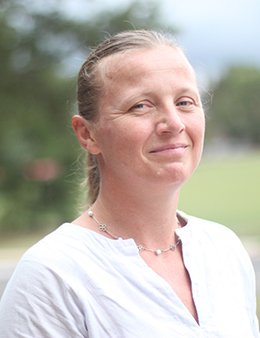Biofilm Based Bioremediation of Persistent Organic Pollutants in Sediment and Stormwater
a Warren Distinguished Lecture with Birthe V. Kjellerup, Civil and Environmental Engineering & Bioengineering, University of Maryland
ABSTRACT
Stormwater runoff has been implicated as a major cause of (re)-contamination of sediment near stormwater and wastewater effluent discharge points in urban watersheds and Department of Defense sites. Removing persistent organic pollutants (POPs), specifically polychlorinated biphenyls (PCBs), from stormwater prevents or significantly reduces the discharge of POPs to urban discharge areas including aquatic sediments. Removal of POPs is a priority due to the ability of these contaminants to enter the food chain where they can present potent toxic and carcinogenic properties. In situ microbial degradation of PCBs represents an improvement. Previous attempts failed because of PCB stability, low bioavailability, low abundance, and activity of indigenous PCB-degrading microorganisms. Activated carbon (AC) and other sorptive substrates have been demonstrated to quickly adsorb PCBs from sediments. Kjellerup’s research group has developed a novel approach to address PCB contamination. They co-localize PCB-degrading microbes onto surfaces of sorptive particles as biofilms, which can be used as a delivery system. This approach can also be modified for treatment of contaminated stormwater and wastewater effluent prior to discharge. The effect of stormwater containing PCBs on sediment quality was evaluated for multiple locations in Baltimore Harbor. Sediment core samples were evaluated and compared to historical PCB concentrations. Kjellerup discusses these experiments along with current strategies for bioremediation of PCBs in stormwater retention cells and in sediment.
SPEAKER
Birthe V. Kjellerup is an Associate Professor at the University of Maryland in the Department of Civil and Environmental Engineering with a secondary appointment in the Fischell Department of Bioengineering. She also serves as the Chair for Diversity, Equity and Inclusion in her department. Dr. Kjellerup has trained as an environmental engineer and microbiologist specializing in beneficial and detrimental aspects of microbial communities for over 25 years. She pioneered the application of biofilms on sorptive materials for bioremediation of persistent organic pollutants and energy recovery from wastewater, and she used them to develop novel bioremediation strategies. Dr. Kjellerup has a strong background in team-based multidisciplinary research and she has obtained nearly $8 million from local, state, and federal funding agencies in the past 8 years at the University of Maryland. Dr. Kjellerup has served on more than 40 graduate committees and is the primary advisor for ten graduate students and five undergraduate students. She serves as a senior editor for the journal Biofilm published by Elsevier and is involved in leadership positions for American Society for Microbiology and the University of Maryland.
